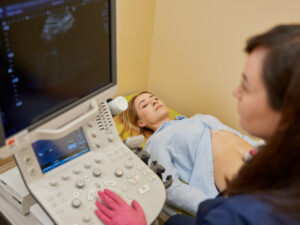
The first trimester of pregnancy is both exciting and challenging. You may not yet look pregnant, but you probably feel it – you have symptoms! But which pregnancy symptoms are normal, and which are a call for help?
In this article, we’ll take you through an overview of the symptoms of first trimester in pregnancy, highlighting the importance of this period and what you can expect week by week. We’ll look at the most common pregnancy symptoms you might worry about, and provide practical strategies to help you manage them.
Understanding and coping with first trimester symptoms can be daunting, but with the proper knowledge and tools, you can navigate this first trimester phase with confidence and ease.
So, whether you’re a first-time mom or expecting a new family member, keep reading to get support for symptoms of first trimester in pregnancy.
Table of Contents
First Trimester of Pregnancy – An Overview
Pregnancy Symptoms and Challenges
The Most Common Symptoms of the First Trimester
Warning Signs and When to Call a Doctor
Coping With First Trimester Symptoms
First Trimester of Pregnancy – An Overview
The first trimester of pregnancy is a transformative and crucial period that spans from your last menstrual period to the end of the 13th week. During these initial months, you will experience significant changes in preparing your body to host your baby.
Rapid cell division, embryo implants, and fetal formation mark the first weeks. By the end of the first trimester, your baby transitions from an embryo to a fetus, with all major organs and body systems in place.
The Significance of the First Trimester of Pregnancy
This first trimester of pregnancy is critical for your baby’s development and establishing a healthy pregnancy. It’s a time when the risk of miscarriage is highest, making proper prenatal care essential.
Regular medical check-ups help monitor your baby’s growth, ensure maternal health, and provide necessary guidance and support.
What to Expect in Your First Prenatal Visits
- Medical history review to understand your health and genetic background.
- Physical exams to check your overall health and identify any potential issues for you and your baby.
- Other screening tests and ultrasounds to confirm pregnancy and gestational age, estimate the due date, and assess fetal development.
During your first prenatal visit, your doctor may also advise you to make some lifestyle adjustments, which may include:
- Maintaining a balanced diet rich in vitamins, minerals, and essential nutrients.
- Taking a prenatal vitamin and perhaps folic acid.
- Staying hydrated.
- Avoiding substances harmful to fetal development, such as alcohol, tobacco, drugs, and certain medications.
- Managing stress through relaxation techniques and adequate rest.
First Trimester Key Milestones
As mentioned, the first trimester is a period of rapid development for your baby. Certain weeks are particularly critical, due to the major milestones that occur.
So, here’s an overview of the most essential transformations your baby will go through during this first trimester of pregnancy:
Weeks 1-4:
Conception occurs, and your fertilized egg implants in your uterine lining.
The placenta – a vital organ that forms during pregnancy and serves as the lifeline between you and your developing baby – develops from the same cells as the embryo and attaches to the uterus wall. You’ll then provide essential nutrients and oxygen to your developing embryo through the placenta.
Weeks 5-8:
A lot is going on inside pregnant women during these most critical fifth to eighth weeks of the first trimester. Any exposure to harmful substances or significant health issues during this period can have a profound impact on your baby’s development.
You can hear your baby’s heartbeat through a transvaginal ultrasound during this period, and the major organs and systems begin developing.
Your embryo starts to form essential structures, including the baby’s nervous system, brain, and spinal cord. Some key organs, such as the liver, lungs, kidneys, and intestines, also begin to build.
Your baby’s arms and legs start to take shape, and tiny buds will develop into fingers and toes. Baby’s facial features, including the eyes, nose, and mouth, also start to form.
Weeks 9-13:
Your fetus continues to grow, and the organs become more complex and functional. The reproductive organs began to form, although gender is not yet obvious.
By the end of this period, your baby develops limbs, fingers, toes, and basic facial features, such as eyes, ears, and mouth.
Many major organs are fully formed and begin functioning, although they’ll continue to mature throughout the pregnancy.
You can now feel more relieved as the risk of miscarriage decreases significantly after this point.
But now, what happens to your body in the first trimester? Why are you feeling so nauseous and exhausted as your baby develops? Let’s get to the symptoms.
Pregnancy Symptoms and Challenges
Unfortunately, for pregnant women, the first trimester of pregnancy often brings a range of pregnancy symptoms due to rising hormone levels as your body adjusts to hosting a baby.
Compared to the second and third trimesters, the first trimester symptoms can be more challenging due to these sudden and intense hormonal shifts.
These pregnancy symptoms typically start around the 6th week and may last until the end of the first trimester or the end of pregnancy – depending on how lucky you are! – and how your body reacts to these hormonal shifts. Some lucky women don’t experience any symptoms!
While the intensity of symptoms varies, they usually peak around the 9th or 10th week and often begin to ease by the end of the first trimester, around the 12th or 13th week.
In the second trimester, many women experience relief from nausea and have increased energy levels. But the third trimester typically brings physical discomfort again, due to pregnant woman anatomy!
Now, let’s deep dive into the most common and challenging pregnancy symptoms you’ll possibly feel at the beginning of your pregnancy journey.
The Most Common Symptoms of the First Trimester of Pregnancy
Feeling exhausted, craving for some unusual food, or vomiting more than you would wish? Worry not and blame it on your pregnancy hormones. Here’s an overview of the most common and quite uncomfortable symptoms you may experience at the beginning of pregnancy:
Nausea and Vomiting (Morning Sickness)
Often starting around the 6th week of pregnancy, you may experience morning sickness, which is a feeling of nausea that can occur in the morning or any time of the day, frequently followed by vomiting.
This symptom peaks around the 9th or 10th week and usually decreases or subsides by the end of the first trimester. It is primarily caused by the rising levels of hormones you’re now producing, particularly human chorionic gonadotropin (hCG) and estrogen.
Fatigue
Extreme tiredness and lack of energy can start as early as the first few weeks of pregnancy. This symptom is often due to increased hormone progesterone levels, lower blood pressure, increased blood production, and your body’s effort to support the growing baby.
But don’t fret. Fatigue usually improves during the second trimester, when many women feel a boost of energy.
Breast Tenderness and Swelling
Typically beginning around the 4th to 6th week of pregnancy, your breasts may feel sore, sensitive, or swollen. This is caused by hormonal changes and increased blood flow to the breast tissue, which is getting ready for breastfeeding.
While this symptom can persist throughout pregnancy, it often becomes less intense after the first trimester.
Frequent Urination
The need to urinate more often than usual often starts around the 6th to 8th week and can continue throughout pregnancy. The cause is increased blood flow to your kidneys and pressure on your bladder from your growing uterus.
Food Cravings and Aversions
Sudden desires for certain foods and aversions to others, often accompanied by heightened sensitivity to smells, can begin in the first few weeks of pregnancy.
These cravings and aversions can vary throughout pregnancy. The main cause is hormonal changes affecting taste and smell, which may also lead to loss of appetite in the first trimester.
Mood Swings
Emotional fluctuations, including irritability, anxiety, and unexpected bouts of crying, often begin in the first trimester and can continue throughout pregnancy.
These mood swings are caused by hormonal changes, stress, and the physical and emotional demands of pregnancy – though they may stabilize after the first trimester.
First Trimester Bloating and Constipation
First trimester or early pregnancy bloating often starts in the early weeks of pregnancy, when you may feel bloated and have trouble with bowel movements.
This happens due to the increased progesterone levels, which slow down your digestive system, causing constipation and gases.
Dizziness and Lightheadedness
Another common and uncomfortable pregnancy symptom is feeling faint or lightheaded due to weight and blood pressure changes, increased blood volume, and changes in blood sugar levels. This symptom can begin in the early weeks and, for some women, may last throughout pregnancy.
Heartburn and Indigestion
A burning sensation in the chest and discomfort in the stomach often starts in the first trimester. This, too, may last throughout your pregnancy.
Hormone changes cause relaxation of the valve between the stomach and esophagus, leading to acid reflux and your symptoms.
Weight Gain in First Trimester
It’s common for you to gain a small amount of weight during the first trimester as your body adjusts to pregnancy. Healthy weight gain during this period is typically about 1-4 pounds.
This weight gain happens alongside a pregnant woman’s anatomy changes – such as growth of the baby, placenta, and increased blood volume.
Loss of Appetite in First Trimester
But you may experience the opposite. Instead of weight gain, it’s weight loss – particularly if you suffer from severe nausea and vomiting (morning sickness). Mild weight loss can be normal, especially if appetite is affected and morning sickness is significant.
Pregnancy Symptoms: Warning Signs and When to Call a Doctor
While many symptoms during the first trimester of pregnancy are common and expected, some signs may indicate pregnancy complications that require medical attention. Knowing when to seek help can help manage potential complications and ensure a healthier pregnancy.
Contact your doctor if you experience any of the following during the first trimester of pregnancy or even later:
- Persistent or severe nausea and vomiting leading to dehydration, weight loss, or inability to keep food and fluids down.
- Extreme fatigue accompanied by other symptoms like dizziness, shortness of breath, or fainting spells.
- Pain or burning during urination, blood in the urine, or inability to urinate may indicate a urinary tract infection (UTI) and need urine tests.
- If you experience Pica – craving non-food items like dirt or chalk – which may indicate nutritional deficiencies.
- Severe mood swings, persistent sadness, anxiety, or thoughts of harming yourself or others.
- Severe abdominal pain, inability to pass gas or stool, or signs of bowel obstruction.
- Persistent heartburn not relieved by medication, or chest pain that may mimic heart issues.
- Heavy bleeding or blood clots. Note that light spotting can be expected during the implantation of the fertilized egg into your uterine line, but if you notice unusual and heavy bleeding or clots, get immediate medical attention.
- Persistent, severe abdominal pain may indicate a miscarriage or ectopic pregnancy.
- A fever over 100.4°F may indicate an infection that requires treatment.
- Severe headaches or visual disturbances may be signs of preeclampsia or other severe conditions.
Coping With First Trimester Symptoms
Managing the symptoms of the first trimester of pregnancy can be challenging! But here are some practical tips to help you manage and alleviate common pregnancy symptoms:
- Eat small, frequent meals instead of three large meals.
- Stay hydrated by drinking plenty of fluids. But sip them slowly and avoid drinking large amounts at once. Ginger tea can help alleviate nausea.
- Take a prenatal vitamin.
- Identify and avoid foods and smells that trigger nausea. Keep simple, bland snacks like crackers by your bedside to eat before getting up in the morning.
- Ensure you get plenty of rest and aim for 7-9 hours of sleep each night. Take short naps during the day if needed.
- Eat a balanced diet rich in iron and protein to help maintain your energy levels.
- Stay active by practicing light exercise, such as walking or prenatal yoga, to boost your energy levels and improve overall well-being.
- Wear a supportive bra, such as a maternity or sports bra, to reduce discomfort.
- Avoid caffeine, as it can increase the frequency of urination.
- Practice stress-reducing techniques such as meditation, deep breathing exercises, or prenatal yoga.
- Eat a fiber-rich diet, including fruits, vegetables, and whole grains, to help prevent constipation.
Experience Exceptional Prenatal Care with Stella Mattina
Navigating pregnancy symptoms can be challenging, but you’re not alone. At Stella Mattina, we specialize in obstetrics and prenatal care with expertise and compassion. If you haven’t yet met us during your first trimester of pregnancy, why not contact us today?
Schedule your prenatal appointment and let’s talk about your pregnancy symptoms.
Dr. Krum is currently in practice in Arlington, TX. He received his undergraduate degree at Texas A&M University, then attended UTMB Galveston for medical school, finishing in 1986, completing his residency there in 1990. Providing a full range of obstetrical and gynecological care, he specializes in the treatment of endometriosis and robotic surgery. He arranges his schedule so that same-day appointments are usually available.






